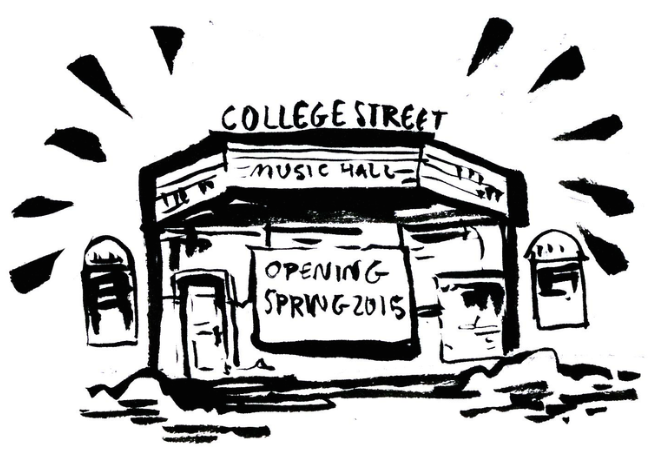 “This is our comeback,” said Andy Wolf. It was January 14, 2015, and the College Street Music Hall had big news to share. The theatre, after being shut down for thirteen years, announced plans to reopen in May. Formerly known as the Palace, and then as the Roger Sherman, it had shut down in 2002 after nearly eighty years at the center of New Haven’s cultural scene. Even though it passed almost immediately into the hands of the New Haven Center for the Performing Arts, it has remained vacant since then. Now, recent changes in the small nonprofit’s leadership have sparked an effort to bring the property back to life.
“This is our comeback,” said Andy Wolf. It was January 14, 2015, and the College Street Music Hall had big news to share. The theatre, after being shut down for thirteen years, announced plans to reopen in May. Formerly known as the Palace, and then as the Roger Sherman, it had shut down in 2002 after nearly eighty years at the center of New Haven’s cultural scene. Even though it passed almost immediately into the hands of the New Haven Center for the Performing Arts, it has remained vacant since then. Now, recent changes in the small nonprofit’s leadership have sparked an effort to bring the property back to life.
For Wolf, director of New Haven’s Department of Arts, Culture, and Tourism, this is about more than an old property regaining functionality. It’s about revitalizing downtown through the performing arts. And although it isn’t technically the city’s project—the funding has come from a private company—the idea behind it came from City Hall.
Both Wolf and Mayor Toni Harp envision a complete transformation of College Street. Instead of just a few blocks with restaurants and theatres, City Hall wants to create a scaled-down Times Square, complete with neon marquees and throngs of pedestrians. The comparison with New York is not accidental. In recent years, musical acts have skipped over New Haven, moving straight from the Big Apple to Boston or Providence. Wolf wants those groups to stop at the College Street Music Hall. “Soon, New Haven’s going to be the sixth borough,” he said.
To most, the idea that New Haven could sparkle like Times Square seems far-fetched. But when the venue opened as the Palace Theatre in 1924, New Haven was a major stop in the American performing arts scene. Everyone from Marlon Brando to the Marx Brothers passed through. For much of the twentieth century, the musicals and vaudeville shows performed at the Palace Theater made it a cornerstone of New Haven’s cultural life. And with the Schubert Theatre just across the street, the image of College Street as a mini theater district wasn’t so far off the mark.
New Haven real estate mogul Joel Schiavone, whose company owned the Palace Theatre, renovated its façade and lobby in 1984. But when the company went bankrupt in the early 2000s, the Palace shut down. The Federal Deposit Insurance Corporation then acquired the building and stipulated that a nonprofit organization become the next owner. That organization was the NHCPA.
The only problem was that the NHCPA did not have the funds to reopen the theatre. Consequentially, the theatre languished. Then, in 2014, with a new mayor for the first time in twenty years, the city approached commercial real estate investor Keith Mahler to start working on the project.
The impetus came partly from Matthew Nemerson, New Haven’s director of economic development. “Our first question when something is empty is: ‘What are the steps necessary for getting it back to life?’” he said.
Mahler, who also works as a concert promoter, convinced Elissa Getto to move to New Haven from Stamford to direct the NHCPA. The nonprofit’s director since last May, she has experience at the helm of struggling arts organizations: her previous position had been at the Stamford Center for Performing Arts, which she had helped rescue from bankruptcy.
The city chose not to allot any funds for the project. Instead, Mahler made a significant private investment and will be the theatre’s promoter. He is working with the NHCPA to run the project.
It is unusual for theatres to undergo drastic change without city or state funding, said Getto, but her team is determined to pull it off by taking a new approach. “Just because we are a nonprofit doesn’t mean we don’t act like a business,” she explains. The College Street Music Hall project is part of a new trend in of urban development: collaboration between nonprofit organizations and private companies. Aside from the Capitol Theatre in Port Chester, New York, the College Street Music Hall is the only regional concert venue developed in this kind of partnership.
With 2,000 seats, the College Street Music Hall is already attracting the talent it needs. On May 1, The Machine will perform the music of Pink Floyd along with the Hartford Symphony Orchestra. A ten-day film festival is in the works, as is a “Count Up to 400” extravaganza—the first annual celebration anticipating the city’s four-hundredth birthday in 2038, which will include a number of concerts.
The hope is that the shows that are planned for the College Street Music Hall will attract Elm City locals, suburbanites, and students from the University of New Haven, Yale, and Gateway Community College. With plans underway to find a replacement for the recently closed Anchor Bar, and a renovation scheduled for the Schubert, College Street is decidedly in the midst of a makeover, even if the comparison to Times Square might seem ambitious.
“Ever since the original nine-square grid, New Haven has been a city designed for culture,” said Wolf. If you ask him if the new College Street is focused on restoring faded glory, he will correct you: “Not restoring history, reimagining history.”


